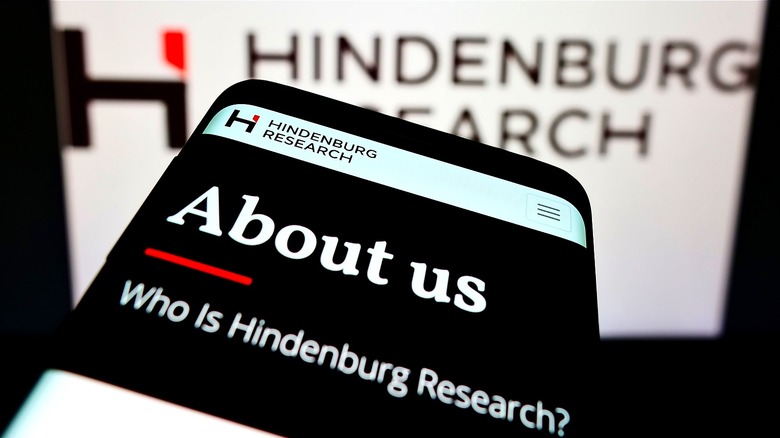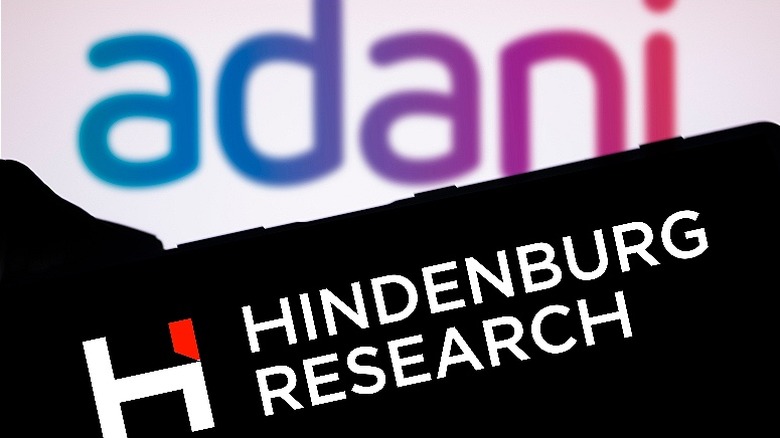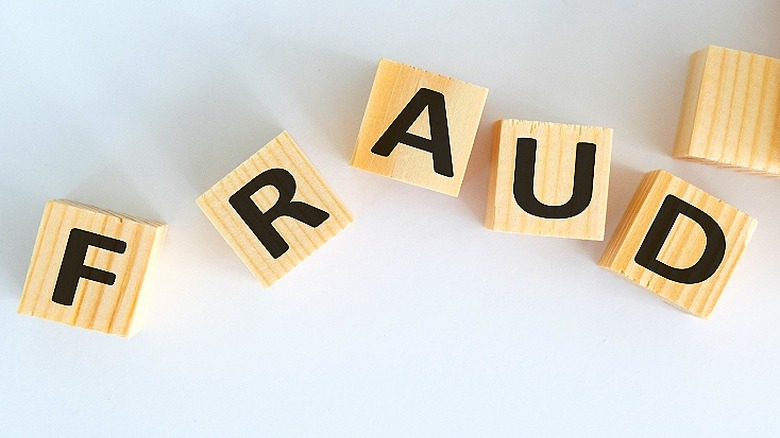The History Of Hindenburg Research, And How It Affects Company Stocks
New York-based Hindenburg Research is a short seller that seeks to beat the market to a company's imminent doom. Yet, this isn't the company's full story. Hindenburg practices its craft in an effort to root out corrupt business tactics and improve the marketplace for consumers and investors alike.
Hindenburg Research sees itself as a "forensic financial research" entity seeking "to provide critical insights and evidence to the public, the market, and regulators to effect meaningful change." Rather than focusing on the payday, Hindenburg founder Nate Anderson and his research firm seek to uncover wrongdoing and expose it to the world. What this means for your portfolio, individual companies, and the marketplace, can mean many different things.
For the investor, the existence of Hindenburg Research is perhaps a breath of fresh air and a relief from business as usual. Since 2017, Hindenburg has uncovered numerous shoddy business practices, outing the offenders in public and often dropping ahead of (and perhaps ultimately resulting in) SEC investigations. For companies engaged in underhanded tactics, the analytical prowess and history of results by Hindenburg should be a startling wake-up call.
Hindenburg specializes in forensic financial research
Named for the Hindenburg, Hindenburg Research calls the May 6, 1937, disaster "the epitome of a totally man-made, totally avoidable disaster ... similar [to the] man-made disasters floating around in the market." In the financial marketplace, these totally avoidable disasters tend to take on the aura of poor fiscal stewardship, corrupt business practices, and/or other cut corners that eventually lead to a meltdown. Companies like Enron (which created one of the worst stock predictions in U.S. history) have worked around safety measures put into place to hide sinking fortunes from the public in order to buffer stock price. Ponzi schemes, shell holdings, embezzlement, and other forms of corruption can decimate countless jobs, the wealth of investors, and the economic landscape more broadly.
It's true that all investments come with a certain amount of risk, such as placing money in FTX's cryptocurrency exchange (here's more on why FTX collapsed). But that risk is assumed to be related directly to the market's movements, not fraudulent activity that artificially pushes stock prices in one direction or another. FTX customers didn't sign up to have their funds funneled into another business owned by the exchange's founder, only to have their money dry up when they wanted to withdraw it. Hindenburg Research's primary aim is to identify these kinds of practices and remedy them before people get hurt.
Essentially, the brand engages in short-selling efforts
Short selling is the practice of buying stock options geared toward capitalizing on negative market movements. Options positions are quite complicated and typically aren't suited to beginner investors (here are 10 tips for those starting out). Essentially, they allow a buyer to utilize a share's current price, but at a later date.
For example, if you short Company X today while it trades at $100, you pay a fee today for the ability to sell those shares for $100 later on, while expecting the price to reduce. This means that a few weeks or months later, if the company's price has dipped to $75, you still get the option to cash in on your position and sell the stock for $100. On the other hand, if prices rise and the company is now trading at $115, you've paid for the position but can't take advantage of the movement. In this sense, short selling is similar to wagering on a game winner, in that there's a binary decision and outcome that either gives you a win or loses your initial stake.
Hindenburg Research was named the top short seller by Activist Insight (now Diligent Market Intelligence) three years in a row from 2020 to 2022, and the brand showcases a lengthy history of blowing the lid on major scandals across industries. From inflated reporting of asset values to insider trading (aka insider dealing), Hindenburg's founder, Nate Anderson, has consistently dug deep into the financials, business relationships, and other mercurial features of industry to identify companies that aren't trading on the up and up. Anderson's reporting has led to numerous investigations, and Hindenburg's resulting short-selling positions often lead to significant financial windfalls.
Hindenburg is more famous for its reporting
While the brand consistently makes quality stock market picks, this isn't its primary interest: That would be reporting. In one of its most recent and highly publicized takedowns, Hindenburg exposed a decades-long "stock manipulation and accounting fraud scheme" within India's Adani Group. The result slashed over $34 billion in wealth from the company's founder, Gautam Adani, over the course of only a week. Hindenburg's research was conducted over two years of investigative work, and concluded with a publication of its findings and a meager short-selling position in Adani Group stock and bond assets that yielded a gross profit for Hindenburg of roughly $4 million.
With each short the company makes, Hindenburg releases a report on its research methods and findings, exposing the underlying hazard that these companies pose to the general public. On average, Hindenburg targets have lost trading value of about 15% directly after the publication of findings from the research firm. To be fair, opponents of short selling suggest that taking a large position that signals mistrust in a company's future can artificially deflate the company's value, sometimes ensuring that a decline in price comes to pass.
But this is somewhat shortsighted thinking. Hindenburg has targeted dozens of companies with its research and short-selling strategy, and the reason for consistent declines in price isn't resulting from the target being placed in the brand, but rather exposure that bares illicit practices for all to see. It's also simply the obverse effect that a large purchase from a venture capitalist might have, rendering the argument somewhat flat.
Since 2017, it's targeted 16 large-scale businesses
Sixty-three people have been charged with activities relating to fraud by the SEC directly on the heels of a Hindenburg Research report and short-selling position. Dozens of companies have been targeted, with 16 large-scale whistleblower efforts taking place since 2017 when the company was founded. The result is the beginnings of a shift in culture among enterprising individuals and their companies.
Make no mistake about it, there will always be bad actors out to make a buck for themselves off the backs of others, but whistleblowing efforts like those of Hindenburg Research make this a bit harder to achieve. And the telltale signs are almost always there when looking back on the movements of a business now in ruins.
Case in point, Enron changed its accounting method to a mark-to-market strategy in 1992, which, while the strategy operates as a legitimate way to evaluate company assets, opens the door for bad actors to cook the books and hide underperforming holdings. This change created the opportunity for untoward behavior and in the end, allowed the practices that would eventually destroy the energy company (as well as investor value, thousands of jobs, and more).
The track record of Hindenburg Research likely strikes fear into the hearts of business ventures everywhere that engage in cut corners and illicit trading activities. As Hindenburg's reporting about Adani Group makes clear, this net is cast far and wide as well, not content with just highlighting predatory business operations in the United States.
It's created significant waves in the marketplace
As well as acting as a quasi-watchdog to detect and remedy the actions of industry wrongdoers, Hindenburg Research can and should offer its example as a loose guide for individual stock pickers.
When the firm publishes research on a new company that it has set its sights on, chances are the share price will tumble. Thus far, the firm hasn't really shown a penchant for jumping the gun or publishing potentially damaging information on a company that isn't doing something it shouldn't. As a functional matter, these reports illuminate features within the inner workings of companies that signal a price depreciation, as is the case with Adani. In its report, Hindenburg noted: "Even if you ignore the findings of our investigation and take the financials of Adani Group at face value, its 7 key listed companies have 85% downside purely on a fundamental basis."
The publication of new findings by Hindenburg signals significant pricing pressure on any brand named by the firm. Selling may be the best approach if you own a company targeted by it. On the flip side, the work done by Hindenburg Research suggests a different course of action, too. Investing in companies that make social responsibility and transparent reporting a priority can help you avoid potentially disastrous trading mistakes. It's certainly not a silver bullet, but this approach can shield you from the kinds of meltdowns that Hindenburg aims to weed out of the modern marketplace.





